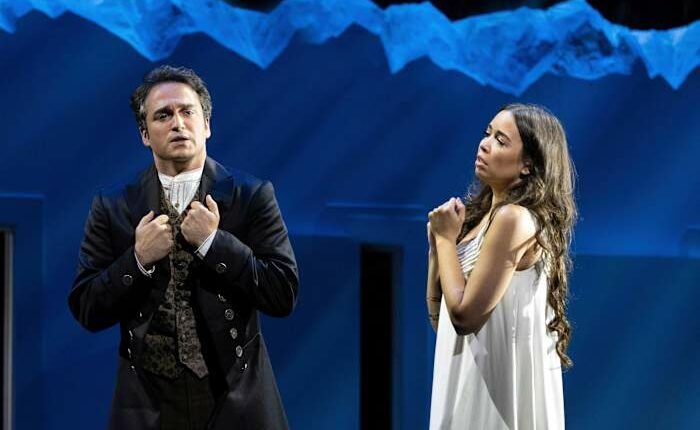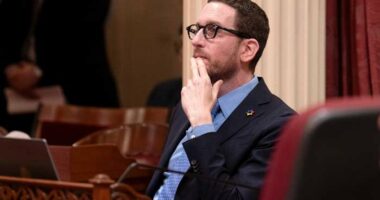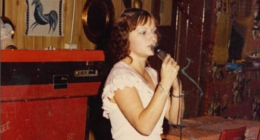Share this @internewscast.com

NEW YORK – The first time tenor Xabier Anduaga auditioned for conductor Riccardo Frizza, a mere two notes left a lasting impression. Frizza recalls, “He opened his mouth, and after just two notes, I realized I was witnessing something extraordinary. It’s a voice you encounter perhaps once every 15 or 20 years.”
Peter Gelb, the general manager of the Metropolitan Opera, shared a similar sentiment. Reflecting on Anduaga’s debut performance at the Met two seasons ago, he confessed, “I was, quite frankly, blown away by his sound.”
At just 30 years old, Anduaga has already achieved stardom across Europe—a feat many tenors only begin to aspire to at his age.
Now, he is making a significant impression on American audiences, starring in the Met’s latest production of Bellini’s beloved bel canto opera “La Sonnambula.” Directed by Rolando Villazon, the production runs until November 1.
Anduaga shares the stage with soprano Nadine Sierra, under the baton of Frizza. The October 18 performance was broadcast live in HD to cinemas worldwide, further expanding his reach.
While the opera notably concludes with a stunning high F from the soprano, Anduaga’s performance alongside Sierra showcases his ability to match her exceptional virtuosity.
“His tenor flows in endless legato, capable of thinning to a silken thread or blooming into ringing, plush fortissimos,” Corinna da Fonseca-Wollheim wrote in her New York Times review.
From boy soprano to star tenor
Anduaga grew up in San Sebastian, Spain, where he started singing as a child.
“We have a big tradition of chorus and amateur music in the Basque Country,” Anduaga said. He began as a boy soprano in church when he was 7, and at age 10 joined the Orfeón Donostiarra Choir, where he first encountered Elena Barbé, who was the choir’s voice teacher.
Once his voice changed he began to study singing seriously, but ran into trouble at the conservatory when his teachers wanted him to study roles that were too heavy for his light tenor voice at the time.
“After a month I was, I can’t sing anymore,” Anduaga said. “I was pushing, not singing naturally.”
“So I called Elena — we were just friends at the time — and I said, ‘I need help!’ I restarted studying with her, and then eventually it became something different, and now we have a baby. We’ve been together 11 years.”
In 2016, when he was just 21, he sang at the Rossini festival in Pesaro, Italy, while continuing his studies. Later that year he was in class when he got an urgent call from the opera company in Bilbao.
“It was Friday, and they told me they had a cancellation and needed a tenor for Monday to sing Don Ramiro in Rossini’s ‘La Cenerentola,’” he recalled. “I called Elena and told her I can’t do it. All I knew was one aria and a duet.
“She said, you have to. It’s a great opportunity. We have to study now. Say you’re sick and come home. She played the piano, and by Saturday morning I knew the whole role. She knows my potential better than I do.”
Texting her husband from the audience
Through marriage and childbirth, Barbé has maintained her role as Anduaga’s coach, chief booster — and most discerning critic.
On a recent Friday night before a “Sonnambula” performance, the couple left 15-month-old Leonardo at their apartment with a babysitter and came to the Met together. While he prepared to go on, Barbé took a seat in the audience and began discreetly texting her husband during the performance. Every time he left the stage he would check his phone to read her comments.
“She’ll point out little things, like, ‘Pay attention to your breathing’ or, ‘Look out at the audience more, not so much at the conductor and orchestra,’” he said.
“She waits until there’s applause so she’s not disturbing her neighbor,” he said. “Sometimes people are looking at her. She doesn’t want to tell them she’s the wife of the tenor.”
Expanding his repertoire
As Anduaga’s voice continues to develop, he said, “it has gotten bigger and is taking on different colors.” Though he is sticking with the bel canto favorites, he is adding some lighter Verdi roles and venturing into French repertory — Massenet’s “Werther” and Gounod’s “Faust” and “Romeo et Juliette.”
Whatever his choice of roles, the people who run opera houses can’t get enough of him.
“In addition to singing like no one else, he dominates the stage and theatrical performance,” said Joan Matabosch, artistic director at Teatro Real in Madrid. “He is, without a doubt, the tenor of the future.”
In fact, Anduaga’s popularity in Europe is such that the Met is having to wait in line.
“We have been actually having trouble booking him because he’s so much in demand,.” Gelb said. As it stands, Anduaga is next due to sing at the Met in the 2028-29 season, in “Rigoletto” and “Romeo et Juliette.”
“Everybody’s always looking for the next Pavarotti,” Gelb said. “I’m not saying he’s the next Pavarotti — but he could be.”
Anduaga dismisses that comparison.
“It’s too big,” he said. “I don’t like ‘new this’ or ‘new that’. When you hear ‘Nessun dorma’ sung by Pavarotti, everyone knows it’s Pavarotti, all over the world, and this will never happen anymore.”
“I try to do my best,” he added. “So let’s just say, it’s me — I’m the new me.”
Copyright 2025 The Associated Press. All rights reserved. This material may not be published, broadcast, rewritten or redistributed without permission.









